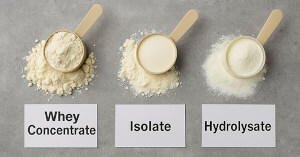
Whey Protein
Whey protein is a fast-digesting protein derived from milk, used to support muscle growth, recovery, and overall protein intake.
Whey Protein is a complete protein derived from milk and contains all nine essential amino acids. It is quickly absorbed and commonly used in fitness nutrition.
It supports muscle recovery, weight management, and general protein intake, especially post-exercise.
Whey Protein is safe for most people. Individuals with lactose intolerance may prefer isolates or lactose-free formulas.
Other names & forms of Whey Protein supplement : whey protein isolate, whey protein concentrate, milk protein, whey supplement
Possible Benefits
Fast-digesting and complete, Whey Protein offers benefits for muscle recovery, weight management, and energy:
- Helps support Muscle Performance & Recovery by providing BCAAs that accelerate repair and reduce exercise-induced muscle breakdown.
- May aid Weight Loss by promoting satiety and preserving lean body mass during caloric restriction.
- Contributes to Energy & Metabolism by supplying high-quality protein that supports efficient energy production.
- Often used to maintain General Health by filling nutrition gaps and supporting immune function via immunoglobulins and lactoferrin.
- May enhance Heart Health by helping reduce blood pressure and improving lipid profiles in some individuals.
Side Effects
Whey protein powder favors muscle synthesis, but early use might come with minor side effects. Watch for:
- Gas and bloating
- Occasional acne breakouts
- Lactose sensitivity symptoms
- Digestive discomfort if overdosed
- Mild headaches
Interactions
Possible interactions include:
- Protein supplements: Whey Protein complements amino acid profiles; ensure total protein intake aligns with dietary needs to avoid renal strain.
- Anticoagulant therapies: Minimal known interactions, but inform your provider if on warfarin.
Precautions
Whey protein is widely used, but certain situations may require extra care:
- Lactose intolerance: May cause digestive upset; opt for isolate or hydrolysate forms.
- Kidney issues: High protein intake may stress kidney function.
- Allergy to dairy: Strictly contraindicated.
- Pregnant or breastfeeding: Choose clean, low-additive products if using.
- Before surgery: Stop one week in advance.
Studies
These studies provide scientific insights into Whey Protein benefits:
A 2018 meta-analysis of 20 RCTs found whey protein with resistance training increases lean mass by 1.5 kg versus placebo.
A 2016 randomized trial in 24 older men showed 30 g whey post-exercise for 12 weeks increased muscle fiber cross-sectional area by 12 % versus 3 % with carbohydrate control .
A 2015 crossover study in 10 healthy adults reported that 20 g whey isolate produced a peak myofibrillar protein synthesis rate of 0.16 %/h versus 0.08 %/h with casein.
Despite broad use, no RCTs have evaluated long-term effects of whey protein on bone health or metabolic syndrome endpoints.
Disclaimer: This page is for educational purposes and does not replace medical advice. If you're pregnant, have a condition, or take medication, speak with a qualified professional.
Related Articles








